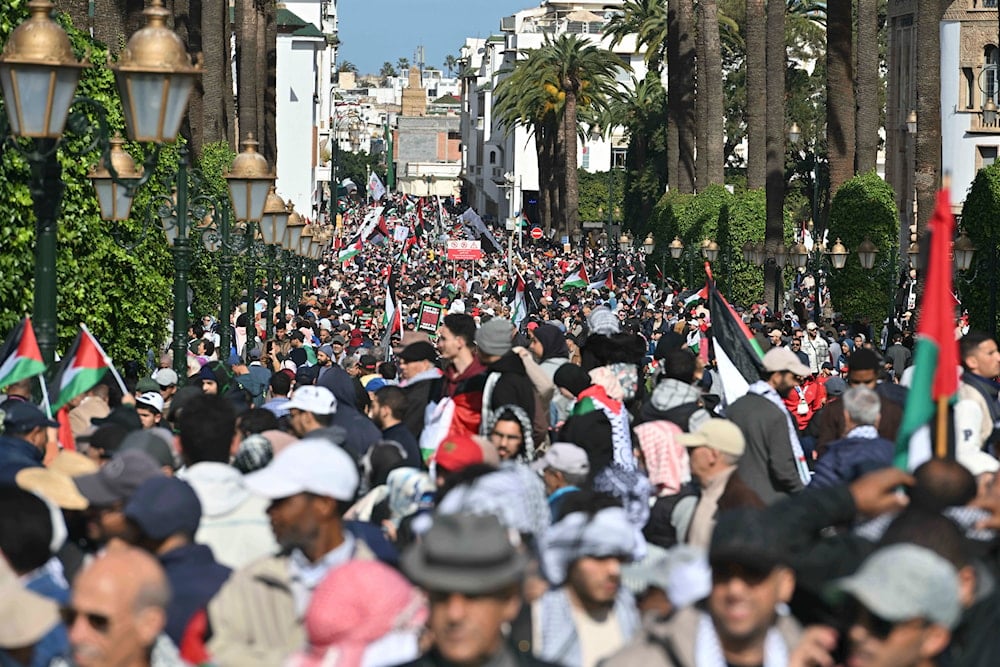War on Gaza dealt blows to Israeli-Moroccan normalization
A new poll shows that the war on Gaza has deeply impacted the effort to normalize ties between the Israeli occupation and Morocco
-

Moroccans take part in a protest in support of Palestinians in Gaza and against normalization of relations between Morocco and the Israeli occupation, in Rabat, Morocco, February 11, 2024 (AP)
Normalization between the Israeli occupation and Morocco has taken a severe hit in light of the unfolding genocide in Gaza, mostly due to "Israel" falling further out of favor among the Arab public, the Israeli Institute for National Security Studies (INSS) revealed Monday, citing a survey conducted by Arab Barometer.
The public opinion survey highlights a steep decline in popular support for normalization between the Israeli occupation and Arab countries, including Morocco. Support has dropped dramatically from 31% in 2022 to just 13%, reportedly due to the ongoing war on Gaza.
According to the survey, Moroccans typically describe the events in Gaza as a massacre (26%), a war (24%), genocide (14%), or mass killing (14%). Since October, nearly weekly protests have been organized in Morocco in support of Palestinians, often calling for the severance of Israeli-Moroccan relations.
This trend exacerbates the tension between Morocco's official policy of maintaining relations with the Israeli occupation, albeit discreetly, and the growing popular and political opposition.
While key aspects of Israeli-Moroccan relations remain unaffected by the war on Gaza, such as bilateral trade and security ties, other pivotal areas have been significantly impacted, including public diplomatic relations, official visits, and tourism.
Saudi-Israeli normalization on hold
Back in May, the US envoy to occupied al-Quds underlined that formalizing Israeli-Saudi relations as part of a developing trilateral agreement with Washington would necessitate a de-escalation of the war on Gaza and a dialogue on future Palestinian governance.
"There's going to have to be some period of quiet, I think, in Gaza, and there's going to have to be a conversation about how do you deal with the question of the future of Palestinian governance," Ambassador Jack Lew said.
"My view is that strategic benefit is worth taking the risk of getting into that conversation about. But that's a decision that the government of Israel will have to make and the people of Israel will have to make," he told a conference hosted by the Israel Democracy Institute (IDI) think tank.
The US described a month ago that a bilateral defense pact with Saudi Arabia was "near final." Once completed, it would be part of a broader deal offered to Israeli Prime Minister Benjamin Netanyahu, prompting him to consider making concessions to secure normalized ties with Riyadh.
Netanyahu has long advocated for such a diplomatic achievement. However, eight months into the war on Gaza, a ceasefire remains elusive, and he believes it is too soon to discuss future Palestinian governance.
'Israel' in decline
"Israel's" ambitions to become the central transportation hub in the Middle East have been thwarted by the ongoing maritime and land blockade aimed at halting the ongoing Israeli genocide in Gaza, according to an analysis by Ahmed Alqarout, a contributor to Mondoweiss.
The regional blockade, as per the analysis, has proven effective and dealt a significant blow to one of "Israel's" primary initiatives: the establishment of a potential "land bridge" linking Gulf countries with "Israel" and Europe.
The "Israel"-centric India Middle East Europe Economic Corridors project (IMEC), initially suggested by US President Biden during the G20 gatherings in September last year, is encountering a significant challenge to its existence, as per Alqarout.
He also highlighted that the IMEC seeks to link Asia and Europe through a network of railways and ports traversing India, the UAE, Saudi Arabia, Jordan, "Israel", and Greece.

 4 Min Read
4 Min Read








